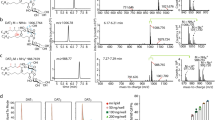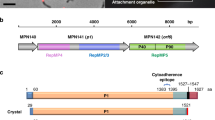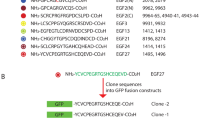Abstract
THE proliferative response of hapten-reactive guinea pig T lymphocytes to trinitrophenyl (TNP)-modified macrophages is regulated by the I-region of the major histocompatibility complex (MHC) of the priming macrophage1. Recent studies2,3 have suggested that the immunogen recognised by the T cell contains both TNP determinants and Ia antigens, as proliferation can be specifically blocked by anti-TNP serum as well as by anti-Ia sera directed against the stimulator macrophage. However, the precise nature of the association between the TNP determinant and the Ia antigens forming this immunogen remains unclear. In an effort to clarify the nature of the TNP-specific immunogen recognised by the T cell, we have analysed, by chemical methods, the membrane proteins of TNP-modified guinea pig macrophages. We report here experiments which demonstrate that macrophage Ia antigens are not directly trinitrophenyl-derivatised on TNP-modified macrophages.
This is a preview of subscription content, access via your institution
Access options
Subscribe to this journal
Receive 51 print issues and online access
$199.00 per year
only $3.90 per issue
Buy this article
- Purchase on Springer Link
- Instant access to full article PDF
Prices may be subject to local taxes which are calculated during checkout
Similar content being viewed by others
References
Thomas, D. W., Yamashita, U. & Shevach, E. M. Transplant. Rev. 35, 97–120 (1977).
Thomas, D. W., Yamashita, U. & Shevach, E. M. J. Immun. 119, 223–226 (1977).
Thomas, D. W., Clement, tLL. & Shevach, E. M. Transplant. Rev. 40, 181–204 (1978).
Shearer, G. M. Eur. J. Immun. 4, 527–533 (1974).
Shevach, E. M., Rosenstreich, D. L. & Green, I. Transplantation 16, 126–133 (1973).
Clement, L., Kask, A. M. & Shevach, E. M. Immunochemistry (in the press).
Forman, J., Vitetta, E. S., Hart, D. A. & Klein, J. J. Immun. 118, 797–802 (1977).
Okuyama, T. & Satake, K. J. Biochem., Tokyo 47, 454–458 (1960).
Arrotti, J. J. & Garvin, J. E. Biochim. biophys. Acta 255, 79–90 (1972).
Bonsall, R. W. & Hunt, S. Biochim. biophys. Acta 249, 281–284 (1971).
Arrotti, J. J. & Garvin, J. E. Biochem. biophys. Res. Commun. 49, 205–211 (1972).
Vidal, R., Tarone, G., Peroni, F. & Comoglio, P. M. FEBS Lett. 47, 107–112 (1974).
Henkart, P. A., Schmitt-Verhulst, A. & Shearer, G. M. J. exp. Med. 146, 1068–1078 (1977).
Author information
Authors and Affiliations
Rights and permissions
About this article
Cite this article
CLEMENT, L., THOMAS, D., KASK, A. et al. Guinea pig Ia antigens are not derivatised on trinitrophenyl-modified cells. Nature 274, 592–594 (1978). https://doi.org/10.1038/274592a0
Received:
Accepted:
Issue Date:
DOI: https://doi.org/10.1038/274592a0
This article is cited by
Comments
By submitting a comment you agree to abide by our Terms and Community Guidelines. If you find something abusive or that does not comply with our terms or guidelines please flag it as inappropriate.



